WhatsApp Chatbot for Logistics with Top Use Cases
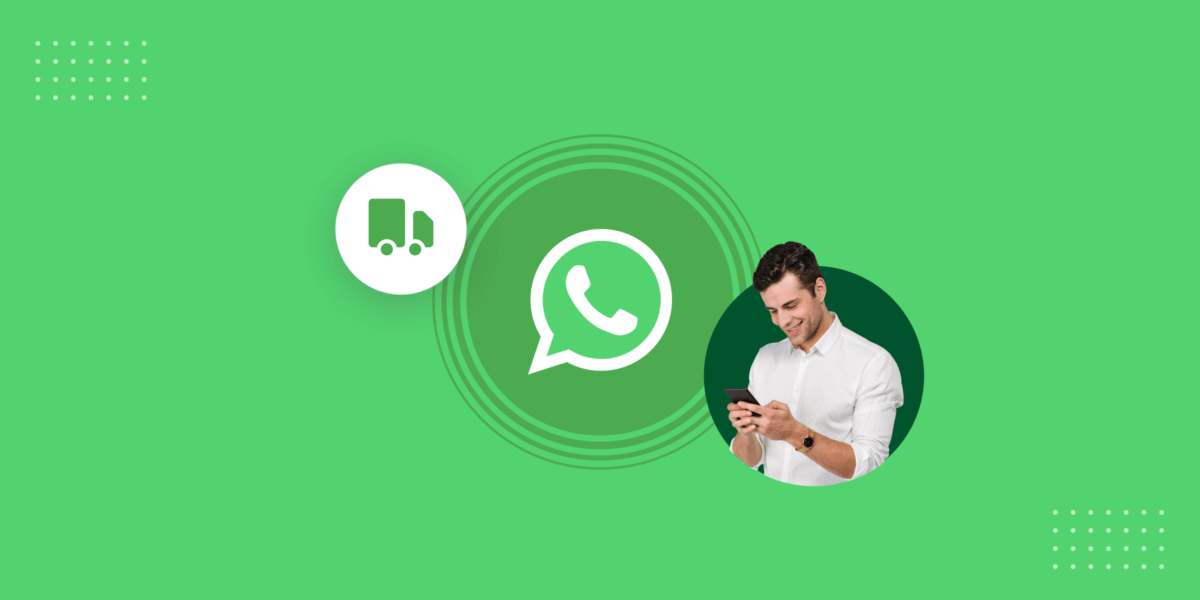
WhatsApp Chatbot for Logistics with Top Use Cases
To understand the need for a WhatsApp Chatbot for Logistics and to comprehend the size of the industry at the same time, consider the following statistic.
According to the India Brand Equity Foundation, in 2018, the cost of the logistics industry was 14.4% of India’s GDP.
At first glance, this is a mind-boggling figure. But there’s more than meets the eye.
Opportunity
The Indian logistics industry is riding a giant wave of growth. According to ICRA, the Indian logistics sector will grow 8-10% annually, beating the five-year CAGR that preceded it.
The $160 billion industry will grow to $215 billion by 2020, according to the 2018 Economic Survey.
It’s well known that India jumped twenty positions in the World Bank’s Logistics Performance Index. The country jumped from 54th in 2014 to 35th in 2016. What isn’t as known, is that India dropped 10 positions by 2018, moving to 44th.
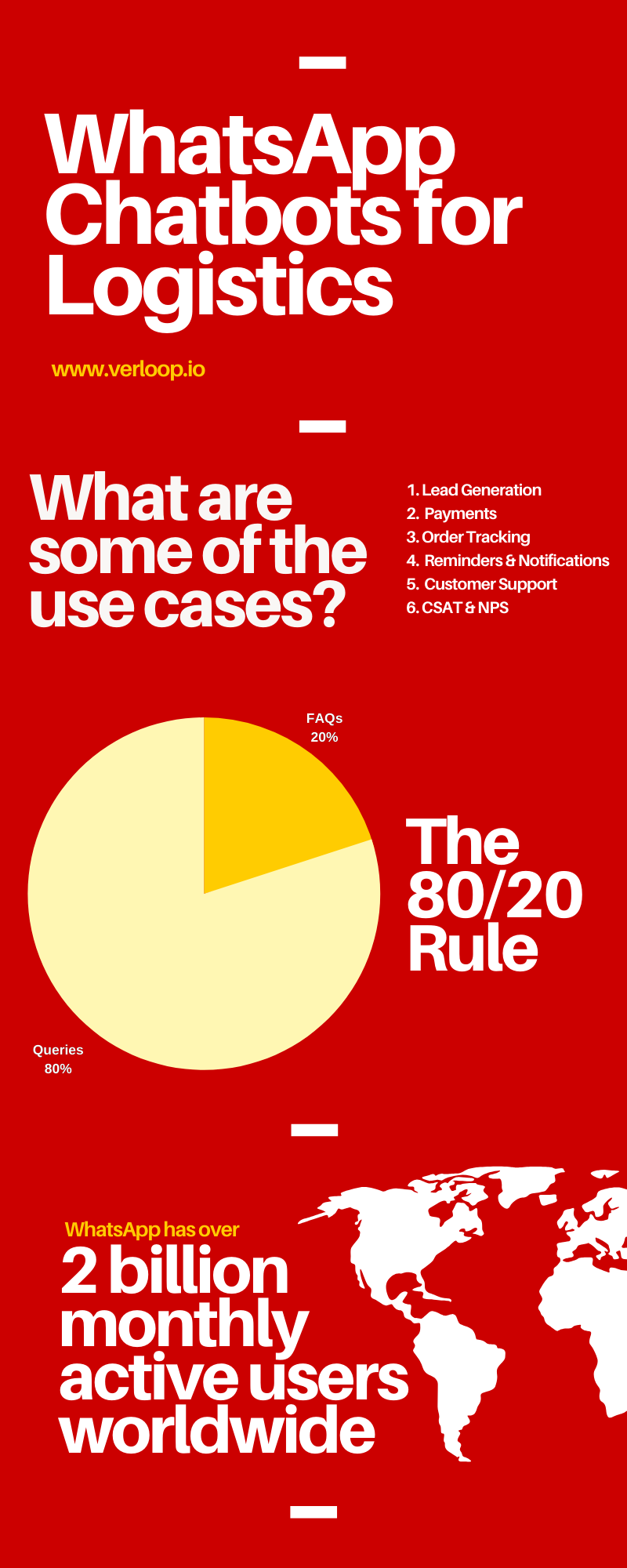
To combat this, the Indian government set up divisions to identify and iron out bottlenecks in the system to boost efficiency. According to ICRA, GST’s implementation boosted average truck turnaround time by anywhere between 18-20%.
While government policies and support have undoubtedly helped, the real driver of this growth is the private sector. New-age tech startups launching conversational AI for logistics are backed by international institutional investors and have played a pivotal role in modernizing India’s logistics industry.
Take, for example, warehousing.
A key cog in the logistics machine; large warehouses allow for better automation. The growth of logistics in India has created an equally impressive submarket for warehouse automation; estimated to grow 10-12% to US$ 3.49 billion by the year 2020.
In five months of 2019 alone, the logistics sector has witnessed a capital infusion of $6.25 billion across just eight deals. That’s a six-fold-plus increase from the amount it raised last year, over 20 deals.
The logistics industry has its own diamonds. Companies like Delhivery (Raised $681M), BlackBuck (Raised 290M), Rivigo (Raised $233M), Ecom Express (Raised $181M), GreyOrange (Raised $80M), Xpressbees (Raised $56M), Reverse Logistics Corporation (Raised $55M), Shadowfax (Raised $46M) and LetsTransport (Raised $33M) have all made their mark on the market.
Problem statement
Logistics is a difficult industry to crack. And that’s exactly why a WhatsApp Chatbot for Logistics makes sense.
Companies in the industry face daunting challenges. From volatile demand patterns and throat-slitting competition to rising fuel costs and dynamic costs, there is no shortage of hurdles to jump through.
The Indian industry struggles with its own unique dilemmas. From poor infrastructure, and road connectivity to regulatory restrictions, Indian players suffer more than most.
Customers are often disenfranchised by the industry too. Issues related to discovery, tracking, transactions, routing and even safety of their products all tie into their lack of trust. Companies struggle with communication, above all else.
The 80/20 rule holds especially true in the industry. 80% of all logistics customer queries come from just a 20% dataset.
Logistics firms deliver millions of packages every day, necessitating thousands of often-repetitive queries.
Notifications sent to inform customers, typically through emails and SMS often go unread, creating a cyclic loop of angry misinformation.
This is further worsened by such communication being static and one-sided. The downside of this becomes that customers and companies simply can’t address the issues as they crop up.
The logistics industry needs a tool that’s
- quick,
- cheap,
- more interactive,
- easy to use
- easy to scale
- and available to the masses.
The solution – WhatsApp chatbot for logistics
Enter, WhatsApp Chatbots for Logistics.
WhatsApp is the world’s largest messaging platform, with an active monthly user base of over 2 billion individuals.
In India alone, over 400 million users use WhatsApp. Over 95% of all iOS and Android devices in the country have WhatsApp downloaded on their devices.
Companies follow customers onto platforms. And there is no bigger platform than WhatsApp today.
With a WhatsApp Chatbot platform, logistics companies can acquire, support and engage customers in real-time.
Acquisition
Use a WhatsApp Chatbot for Logistics as an additional channel to acquire customers. Generate and qualify leads on a conversational platform that sees 3x the conversion of traditional channels.
Unlike forms that only see conversion rates of 1-5%, bots can average conversion rates of 20% and higher.
Learn how Lido Learning used a WhatsApp chatbot to move to 100 chat support and improve their form fill rate to >22%, which is 10-15% more than what they were seeing on their platform.
Support
By virtue of the sheer scale of the number of orders delivered, logistics companies see hundreds of thousands of support tickets.
Handling this magnitude of queries requires large, and expensive human teams. And since these queries are often repetitive, they clog up support pipelines resulting in subpar customer experiences.
With a WhatsApp Chatbot for Logistics, you can automate up to 80% of support queries and reduce support-related costs, tickets and staff.
Suggested Reading: Customer Support Automation and Its Importance
Engagement
Proactively sending customers notifications, alerts and reminders ensure they’re well-informed about their orders. This reduces their dependency on customer support teams.
However, traditional channels of engagement like emails and SMS see low delivery and open rates. Outbounds on WhatsApp, however, have a delivery rate of 100% and a read rate of 97%.
More importantly, a WhatsApp Chatbot for Logistics allows customers to reply to these messages. Users can reply to change addresses, postpone deliveries and provide specific drop instructions.
The net results of these use cases are
- Increase in high-quality leads generated
- Improvement in operational sales efficiency.
- Increase in topline sales and revenue.
- Increase in brand recall, NPS and humanization.
- Better delivery, open and conversion rates.
- Increase in Customer Lifetime Value.
- Increase in NPS and CSAT scores.
- Decrease in required support staff, tickets, and costs.
- Increase in Customer Return Rate and CES.
But how do they work in the real world?
How to use a WhatsApp chatbot for logistics
Below are some real-life use cases and examples of how logistics companies can use a WhatsApp Chatbot.
- Lead Generation
- Lead Qualification
- Payment
- Order Tracking
- Reminders and Notifications
- Two-Way Messaging
- Nearest Service Center Detector
- Issue Claims
- Feedback and CSAT
Lead generation
Consider a customer who’d like to send a package using TNN Logistics.
When he texts the company’s WhatsApp bot, his name and phone number are automatically collected through the latter’s’ logs.
This means that all that TNN has to ask for is an email ID. Fewer questions and a friendly interface equal higher fill-up rates and more customers.
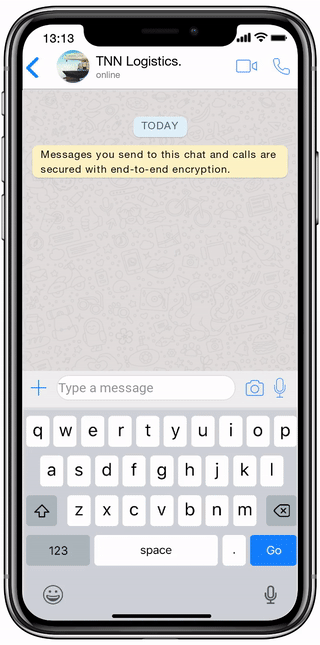
Generate more customers, around the clock, with no human support – using a WhatsApp Chatbot.
Lead qualification
Once TNN Logistics knows who’s asking, it’s time to find out what they need.
Gather details like location, requirement, and weight; improving funnel efficiency and reducing your dependency on humans.
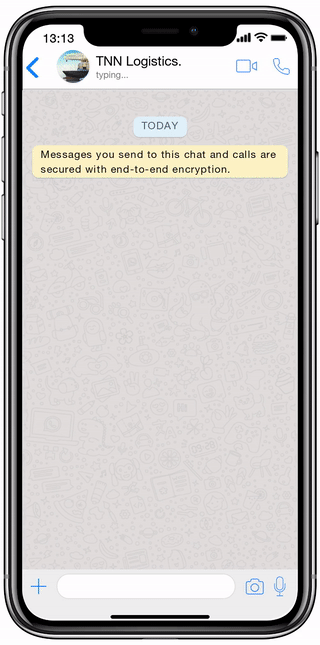
Automated lead qualification is important because it saves you time, energy, and ultimately your bottom line.
Bucket leads with specific requirements to the appropriate teams and ensure no lead is missed.
Payment
Use WhatsApp’s end-to-end encryption to safely send payment updates, links and OTPs.
Allow customers to choose the preferred payment options and offer solutions based on their selection.
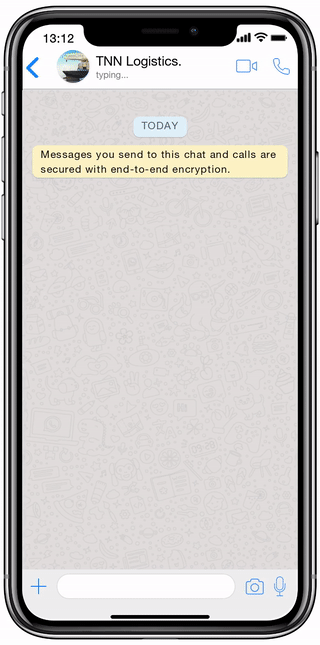
Providing customers ease of payment is critical. Hence, customers are likely to pay faster and sooner as opposed to if they had limited options.
Order-tracking
The most crucial aspect of a WhatsApp bot is order tracking.
A significant portion of all support tickets is order-related queries.
A WhatsApp Chatbot for Logistics allows companies to automatically
- Inform customers of where an order is
- Troubleshoot any problems related to it
- Provide tracking information in real-time
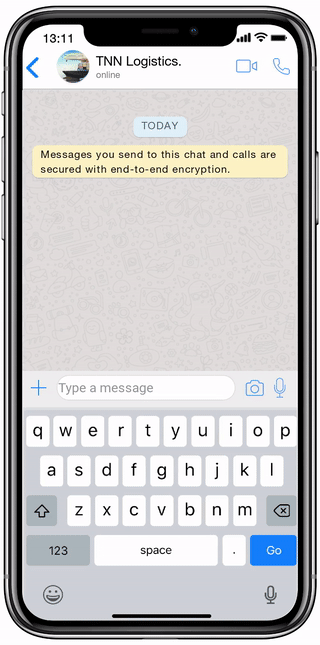
Empowering customers to self-service themselves improves customer satisfaction and reduces the load on your support team.
Reminders and notifications
WhatsApp allows you to send templated messages to proactively send customers updates, reminders and notifications about their orders.
Capitalize on WhatsApp’s high delivery, read and reply rates and allow your customers to take charge of their orders.
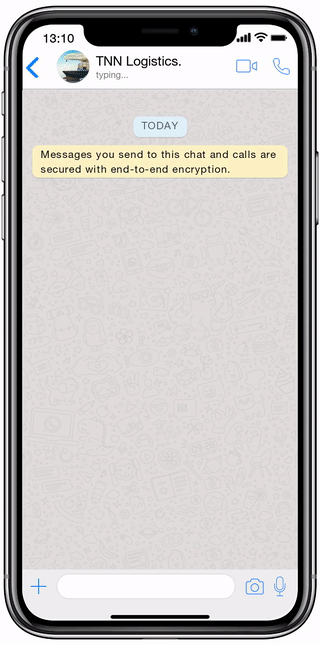
With WhatsApp’s two-way interface customers can change address, reschedule deliveries, etc. Additionally, this improves delivery success rates and reduces reverse logistics charges.
Two-way messaging
Once you’ve automated your low-level, repetitive queries, you can focus on those critical high-level queries.
Verloop’s warm handoff allows the bot to understand when a customer requires human support and automatically transfers the chat to the appropriate agent.
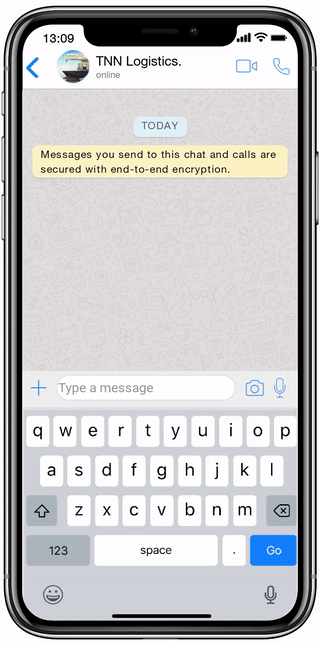
You can also transfer chats to different departments based on specific keywords and needs that the bot detects.
Nearest drop-off locator
Allow customers to locate nearby stores with ease using a WhatsApp Chatbot. Send Google locations so customers can drive to your stores with ease.
Making this information easy to access reduces the hurdles to a successful transaction.
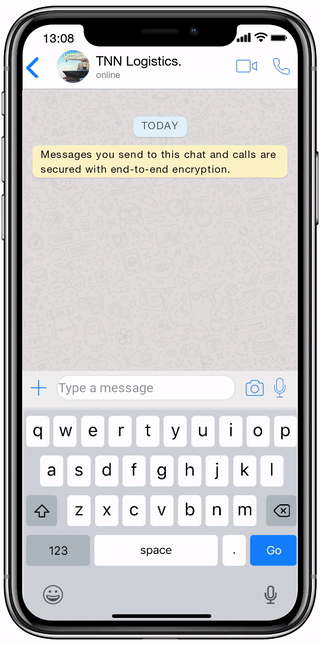
Enable users to send locations, pin codes or type localities and show them a store nearest to them.
Returns, refunds and high-level queries
High-level queries need an agent, from start to finish.
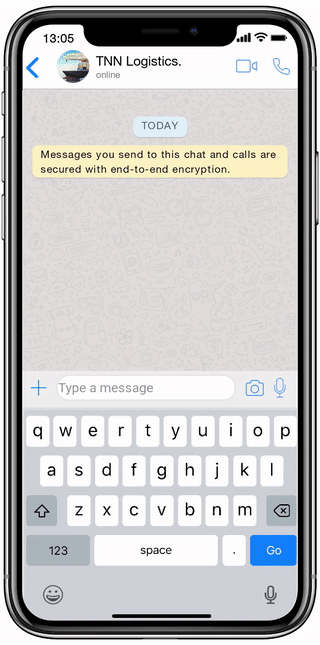
A WhatsApp Chatbot also allows for unbelievable media richness, therefore, customers can send images, documents and other necessary information needed to validate their returns.
Feedback and CSAT
CSAT (Customer Satisfaction Score) and NPS (Net Promoter Score) are the pillars upon which customer loyalty metrics are built.
However, collecting this data poses a significant challenge. Customers rarely respond to traditional means of outreach like Email or SMS.
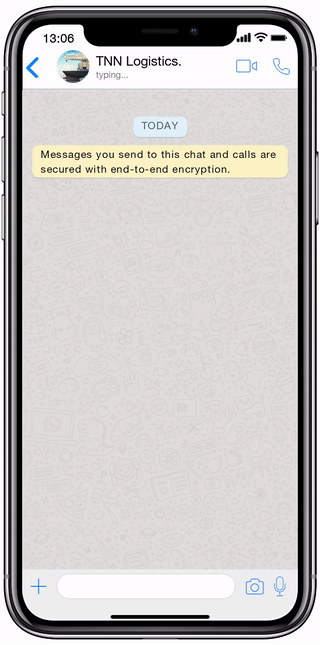
This allows companies to keep a close tab on their customers and their employees as well- i.e. are they providing the customers what was promised.
Any logistics company will have an army of clients under them, which increases by a great amount every day. To service the needs of a plethora of clients it’s much better to pass on a handful of activities onto the WhatsApp Chatbot for Logistics.
Holding an open rate of 97% and a 100% delivery rate, WhatsApp Chatbots are the best communication medium for any Logistics provider.









